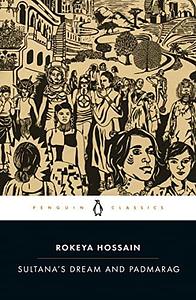Take a photo of a barcode or cover
inspiring
Loveable characters:
Yes
Written over a hundred years ago, Rokeya Hossain’s idea of a feminine utopia is a wondrous one that inspires, the story of Padmarag though uninteresting at times was ultimately quite sweet, enchanting even, and by the last few chapters as hearts swelled and loves rounded out I was giddy, saying out loud to myself ‘I do love a romance’.
Noting also the final brief essays on religion, tradition, education, and women’s role in Indian society - I am reminded of a Francis Bacon quote, “Read not to contradict and confute, nor to believe and take for granted... but to weigh and consider.” It is certainly how I would like to behold life and the world, and these words, these worlds, these stories of another time.
slow-paced
Sultana's Dream - Standard short utopian work - nothing unique if you've read a lot of these but still pretty interesting. Also interesting how such similar stories/imaginations emerge from seemingly disparate cultures
Padmarag -More interesting. Reminiscent of Sarah Scott's "Millenium Hall" as the intro notes. Notable depiction of female society formed to provide girls education/alms for disenfranchised women and the poor. Inspired by the author's own experiences running a similar institution and a very interesting document of these efforts paired with a subversive romance plot. Really liked the ending.
Padmarag -More interesting. Reminiscent of Sarah Scott's "Millenium Hall" as the intro notes. Notable depiction of female society formed to provide girls education/alms for disenfranchised women and the poor. Inspired by the author's own experiences running a similar institution and a very interesting document of these efforts paired with a subversive romance plot. Really liked the ending.
inspiring
medium-paced
Plot or Character Driven:
Character
Strong character development:
No
Loveable characters:
Yes
Diverse cast of characters:
Yes
Flaws of characters a main focus:
No
Bengali, feminist, Muslim writer from early 1900s - writing pre- partition. Often we see Muslim feminists as a relatively new thing - although there is a long history of feminists from that tradition.
I appreciated how she separated the concept of cultural seclusion from purdah. The women in Padmarag although in some ways harmed by a society that does not consider them equal - all have a sense of personal empowerment.
I appreciated how she separated the concept of cultural seclusion from purdah. The women in Padmarag although in some ways harmed by a society that does not consider them equal - all have a sense of personal empowerment.
I loved both the stories. My only problem with the book was the translation. The current translation leaves a lot to be desired. Beyond a point, I was beginning to wonder if the English version hadn't twisted the original intent of a few chapters. It's also very interesting to see how far we've come in our thinking and yet, how much certain things remain the same since the time the book was written more than a century ago. Despite the blotchy translation, I would still recommend this book to get a peek inside the world of Muslim Bengalis from the pre-independence era. If you read the foreword, you'll learn that a lot of the story derives from the writer's personal experiences, Padmarag possibly more autobiographical than it lets on in the novella.
reflective
medium-paced
It is difficult to imagine a woman daring to publish a speculative fiction piece about a feminist utopia back then, and that too in English. Rokeya, you will always be famous.
Perhaps I should have read Padmarag in Bengali after all since I believe much of the beauty of the story had been lost in translation. Nonetheless, I enjoyed it for what it is.
It is rather unfortunate how these two tales are still relevant in this day and age. How much have we progressed really?
Perhaps I should have read Padmarag in Bengali after all since I believe much of the beauty of the story had been lost in translation. Nonetheless, I enjoyed it for what it is.
It is rather unfortunate how these two tales are still relevant in this day and age. How much have we progressed really?
challenging
reflective
slow-paced
Plot or Character Driven:
Character
Strong character development:
Yes
Loveable characters:
Complicated
Diverse cast of characters:
Complicated
5/5
fuck!!!!!!! IN THIS HOUSE WE STAN SIDDIKA/ZAINAB/PADMARAG!!!!
i love Indian literature and Feminist literature, then it is combined in a book like this with such heavy culture and diversity and passion and soul, and BAAM, im sold. This is a very very simple book, it consists of two stories first being a 15 paged story based on a utopian feminist country named Ladyland, and the second is heavily based on literal women's badassery and their rise from oppression in the 1920s(fictional ofc). The sexism has reduced of course but the resemblance to what it is now and what it was a century ago is uncanny. Talking about the language, the translation is very simple and beautiful, and it's not a sad book, it's a book of rising above but it just makes you cry for the most basic achievements. The story is intertwined perfectly with a reveal at the end.
fuck!!!!!!! IN THIS HOUSE WE STAN SIDDIKA/ZAINAB/PADMARAG!!!!
i love Indian literature and Feminist literature, then it is combined in a book like this with such heavy culture and diversity and passion and soul, and BAAM, im sold. This is a very very simple book, it consists of two stories first being a 15 paged story based on a utopian feminist country named Ladyland, and the second is heavily based on literal women's badassery and their rise from oppression in the 1920s(fictional ofc). The sexism has reduced of course but the resemblance to what it is now and what it was a century ago is uncanny. Talking about the language, the translation is very simple and beautiful, and it's not a sad book, it's a book of rising above but it just makes you cry for the most basic achievements. The story is intertwined perfectly with a reveal at the end.
inspiring
reflective
fast-paced
Plot or Character Driven:
Character
Strong character development:
Yes
Loveable characters:
Complicated
Diverse cast of characters:
Yes
Flaws of characters a main focus:
Yes



